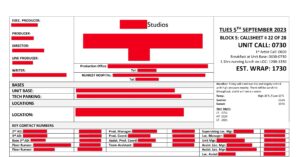I started this article before lockdown but now it seems more relevant than ever. As our industry (slowly) comes back there will be more and more people trying to cut corners and take advantage so we need to recognise it. And stand up for our colleagues and ourselves.
I write articles about fair pay and fair hours, I advocate to my friends and tell plenty of companies that I won’t work for them because they don’t pay enough or their demands are unreasonable. I am incredibly vocal about workers’ rights and I can usually recognise manipulation when I see it. But earlier this year I found myself in a low paid job being manipulated into working overtime for free. I write this article to show what the tell tale signs are. For context it was a workshop job employing several freelancers to make for a large-scale show.
1. My co workers were lovely
Firstly the age old problem: the people I was working with (not the boss but the people on my level) were lovely, and I could see them struggling due to short deadlines and lack of resources. I wanted to help them; it wasn’t their fault that there weren’t enough hours in the day. If I went home, then they would have to work longer to get things done as the amount of work was hectic.
2. “It’s theatre, it’s going to be low budget”
I was also being told by other freelancers in the company that they “don’t expect overtime because it’s theatre and low budget”, which made me feel like I was being unreasonable. If other people in the same position tell you it’s fine and you should be working for the love not for the money, and that you should want to help more and not only think of yourself then it’s hard to argue the point. With other people believing this, it meant that they stayed late every evening, meaning that when I left on time (or even after the agreed time) I looked like I was leaving early and not committing to the work. Also:
Theatre is one of the subsectors of the creative industries, which is worth £101.5 billion, growing at nearly twice the rate of the UK economy
UKtheatre.org
3. Taking more responsibility than you are being paid for
The third thing that happened a lot was being expected to take on personal stress. It is the company’s job and they should be keeping an eye on the overall deadlines. You should work to the best of your abilities but if something is unrealistic you need to be able to tell people and get help, not be made to feel like a failure because the expectations are too high. A good company helps with this instead of making you feel like the overall deadline is your problem or your fault
4. Small perks
Something that added to this was being offered small perks to make up for larger discrepancies. The most common of these is the coffee run, after people had spent the previous night working until midnight, no overtime pay was even mentioned but the boss came over with coffee for everyone and everyone said “what a good boss, he has our best interests at heart” and I am not saying this was premeditated to deflect from the problem but one coffee doesn’t make up for 6 hours unpaid overtime and no one should ever be asked to think that it does…
The job had a lot of other faults as well, but these were the big red flags for me that I was being taken advantage of. The problem with all these things though is that they are subtle and easy to let slide or to miss. The sad truth is that the people I was working with were used to being downtrodden and being asked to work for free, and in allowing it to happen to themselves they were unknowingly perpetuating a system that keeps everyone else down as well. In turn this meant that they believed themselves when they told me that I should not ask for overtime and that I should enjoy working there without expecting anything else. I believe you should work hard on any job and do what you can to get the job done but overall you are there to pay bills and live your life, not to work yourself into the ground for someone. The point of overtime pay is to give you money to take proper time off at the end of a job to recover. Film rates are high because they ask for your life but at the end you can afford a holiday or some time at home to sleep and recover. It is not ok to make people think that if they expect money for overtime that they are being selfish or unrealistic.
So what should I have done?
I should have stood up to my boss, I should have told him that I wouldn’t be doing any more overtime unless we agreed on an overtime rate and I should have done it in front of the other people working there. The fact is that it shouldn’t have all been on me though – every person there should have demanded over time and should have refused to work over their set hours without it. I don’t say this to blame anyone, I say it to show you that by not following a strict code of conduct yourself you set a precedent to allow this to happen to other people. My co-workers never asked me to stay late, but in doing so every day it obligated me to do the same. So please, stand up for yourself, it will stand up for other people in turn and if someone else highlights a problem at work, stand with them. Being taken advantage of is not ok but people will keep doing it if they think they can get away with it. And this is becoming all the more apparent with people desperate to work. During lockdown everyone was saying let’s bring this industry back better than before. It starts with knowing our rights and speaking out when they are ignored.






